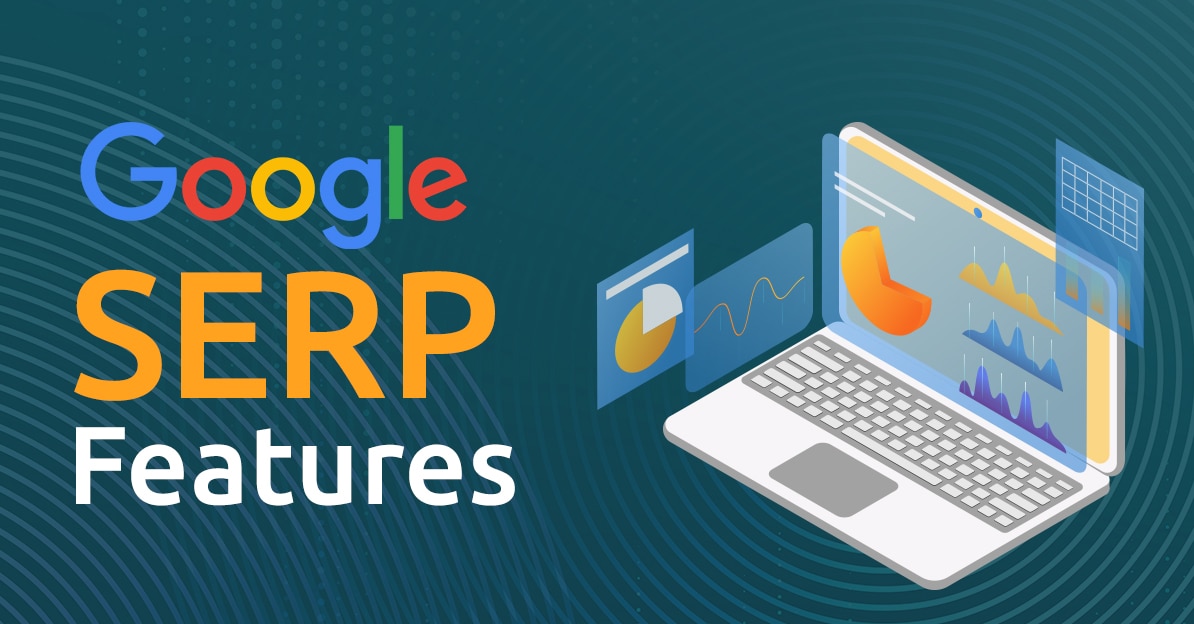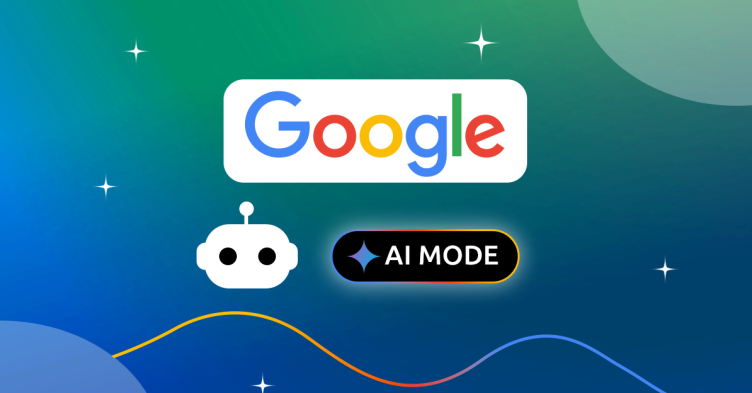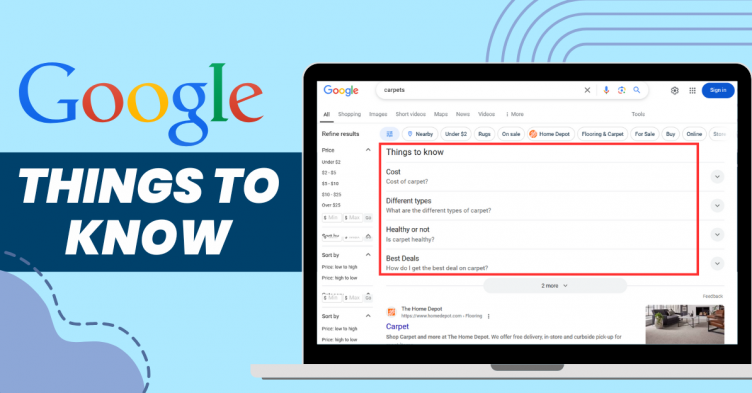Google is constantly adjusting and adding new SERP features to offer diverse search results to give searchers what they want. Depending on the search query, users may see maps, images, videos, questions and answers, AIO (AI Overviews) and much more. It’s important to note that the appearance and order of these SERP features are constantly changing.
While these constant updates and personalization are beneficial for customers, they can be quite frustrating for digital marketers. However, when utilized effectively, Google SERP features can serve as a powerful search visibility booster for SEO and SEM managers. Insights on SERP features can help search marketers optimize content to drive more traffic, achieve better above-the-fold visibility and allocate marketing budgets efficiently to maximize search marketing ROAS (Return on Ad Spend).
This article explores various Google SERP features available and highlights benefits that come with appearing on these features.
Let’s begin!
Table of Content: Show
Google SERP Features refer to all organic and paid elements that appear alongside the “Traditional 10 Organic Links” on Google Search Engine Result Pages (SERPs). Example Google SERP features include “AI Overview”, “People Also Ask,” “Featured Snippets,” “Text Ads,” “Video Carousel,” “Knowledge Panel”, “Merchant Listings” and many more.
Considering Google SERP features in 2024 and understanding their impact on your performance is crucial. This aspect can prove highly beneficial when planning your keywords, and creating and optimizing your content. By taking SERP features into account, you can strategically align your content to maximize its visibility and effectiveness in search engine results.
Each Google SERP feature displays different types of information to accommodate their customers at various stages of the shopping journey to enhance their experience.
For brands, retailers, and any other businesses, there are two primary strategies on the SERP: i) SEO and ii) SEM. These strategies aim to optimize websites and increase their paid and organic visibility, traffic, impressions, clicks, and conversions on the SERP.
We have all witnessed various types of SERP features appearing for different keywords. However, it can be challenging to determine which SERP feature is best suited for your strategy.
This is where SEO (Search Engine Optimization) and SEM (Search Engine Marketing) come into play.
For any relevant searches, SEO optimizes the content on a website and its structure to rank them higher. By appearing on the first page of the SERP, a website can attract more clicks and organic traffic, thus increasing visibility and potentially generating leads and sales.
SEM, on the other hand, is used for paid search ads to appear at the top of the SERP for specific keywords. These ads target specific audiences and help businesses drive traffic rapidly. By analyzing the performance of these ads, businesses can adjust their targeting and bidding strategies, improving their return on investment (ROI) to achieve their marketing goals.
In both SEO and SEM, understanding the role of the SERP, key factors influencing rankings, and optimizing marketing and advertising strategies to achieve higher SERP rankings is crucial.
SEO and SEM teams can leverage the information provided on the Google SERP to gain a better understanding of their total search performance on the platform.
→ Read more about how to optimize for top SERP features
The Image depicts the list of SERP Features in 2024 that frequently ranked and appeared in the SERP estate.
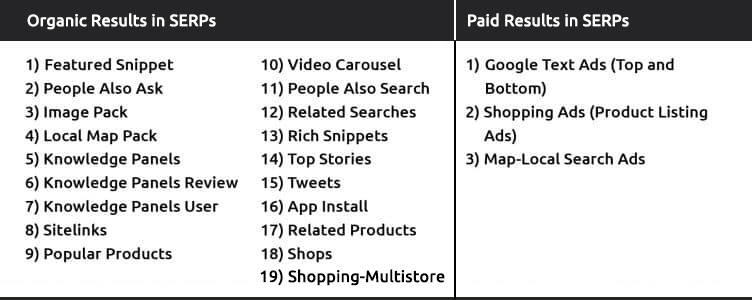
There are two types of Google SERP features that appear regularly.
- Organic SERP Features
- Paid SERP Features
Now, let’s learn about all the Google SERP features in more detail.
In 2024, organic SERP features are the additional elements and listings that appear on a search engine’s results page naturally, without any paid promotion or advertising. The listings are based on factors such as relevance, quality, authority, and what the search engines deem most relevant to the user’s queries.
Organic SERP features are achieved through the implementation of SEO (including Local SEO) and content marketing strategies.
- Content Optimization
- Search Engine Optimization
- Local SEO
- Keyword Research
- Understanding the user intent
These strategies play a vital role in securing and maximizing your organic visibility, ultimately enhancing the overall positioning of organic SERP features.
Let us go through details about some of the most common organic SERP features that appear on Google.
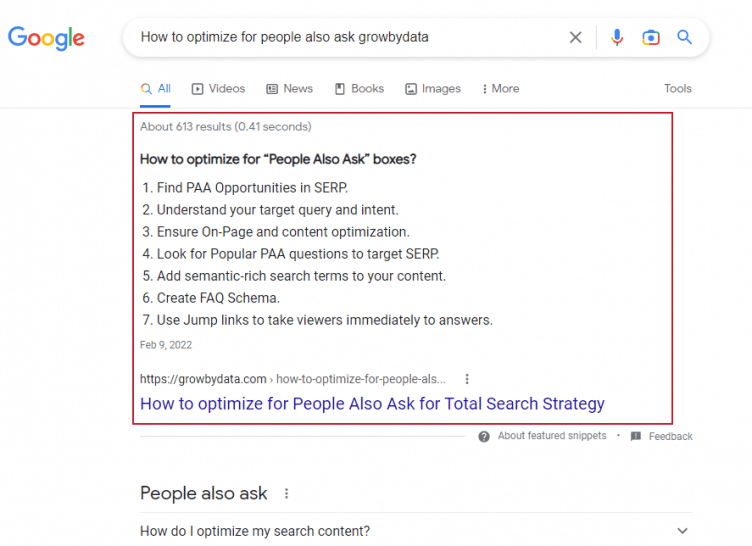
The Google Featured Snippet is a large box located at the top of Google SERP where Google displays a snippet of content from the top-ranking organic results in the SERP. Google first began displaying featured snippets directly in its SERP in 2014. It is showcased when the search query shows informational intent. This feature provides valuable pieces of information in a precise form giving searchers a quick answer to their questions. It features text or video from a website that directly answers the search query. The different formats for featured snippets are paragraphs, bulleted lists, and tables.
- Paragraphs
- Lists
- Video
- Tables
Per Ahrefs, the Featured Snippet gets about 8% of all organic clicks a significant impact on the organic click-through rate. Featured snippets put your website at the top of the SERP and make it more clickable on both mobile and desktop.
Benefits of Featured Snippets
- Increase in organic traffic and clicks leading to the website.
- Increase in organic conversion.
- Highest visibility over authoritative brands.
- Boost website and brand credibility.
- Increase in the keyword’s ranking.
Learn about the Types of Google Featured Snippets
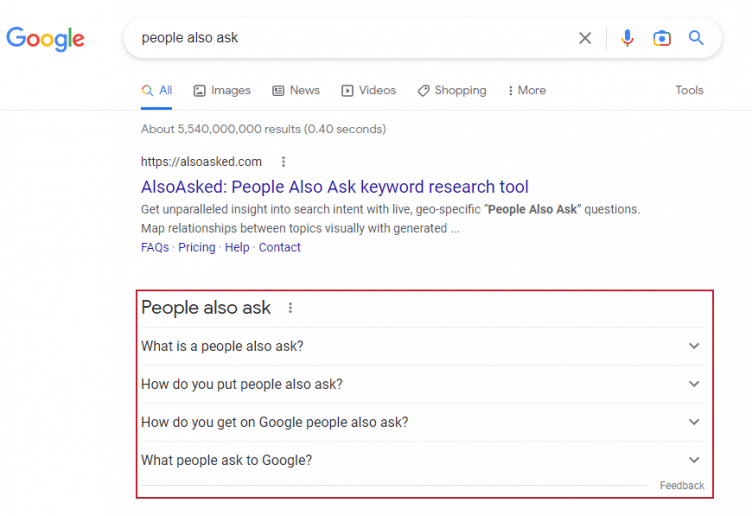
The “People Also Ask” box showcases an infinite list of algorithmically generated questions that are relevant to the search query. Google introduced the “People Also Ask” (PAA) feature on its SERP in 2015. This dynamic Google SERP feature aims to provide users with additional information by answering a series of closely related questions based on their initial search query and their intent.
According to Advanced Web Ranking, this organic SERP feature shows up in 8.5% of all US-based search queries. They are mini-FAQs placed in the organic search results. The goal of PAA is to provide an easy way to answer the user’s initial query and possibly the subsequent queries that may follow.
Benefits of People Also Ask
- Discover related keywords and create long-tail keywords that can be used to optimize your website.
- Helps to create better content.
- Aids in getting more traffic and improves the click-through rate which is important for ranking higher.
- Avoid brand degradation with better answers for branded queries.
Learn More on How to Optimize for People Also Ask
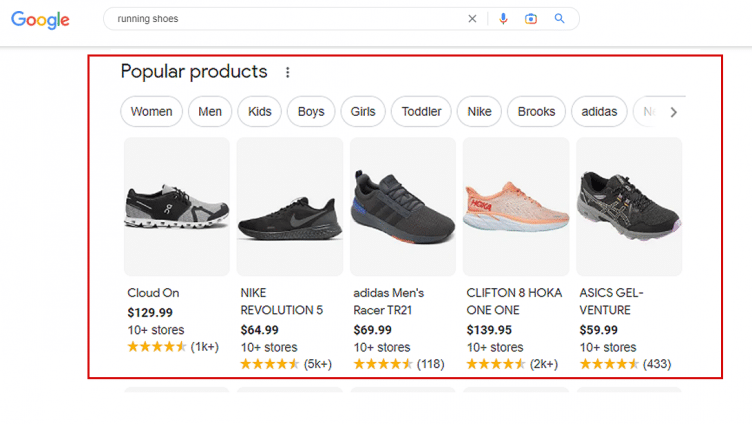
Google Popular Products is an unpaid and organic display of Google shopping product listings. It showcases a carousel of products that are relevant to your search term and available for purchase. Google Popular Products can considered as the most sought organic SERP features in Google Shopping and is positioned in the middle of the search result page. Users can filter by price or by product category within the popular products feature.
Benefits of ranking on Google Popular Products
- It allows smaller e-commerce stores to compete with stores with a larger budget.
- Occupies a large real estate on the SERP giving you good visibility when your product shows up under it.
- It creates more opportunities for retailers to have a presence on the Google SERP
Get a Complete Guide on How to Rank for Google Popular Products
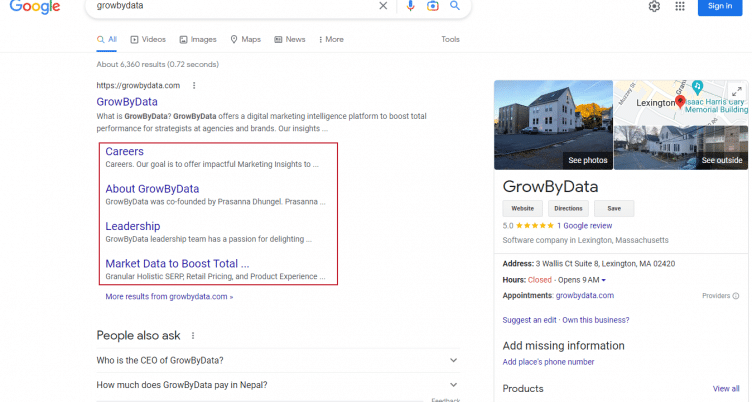
Sitelinks are a collection of links to various pages within a particular website, displayed beneath the main URL and description of a search result on Google’s SERP. Google began displaying Sitelinks directly in its SERP in the early 2000s. These Sitelinks are automatically generated by Google’s web crawlers which helps users quickly find a page or content within that site. The more site links you get directly influences the ease of visitors’ navigation through the site, enhancing their browsing experience.
Sitelinks come in two main forms: Links that take searchers to a page on a website or those that take searchers to a section of a page. Sitelinks usually appear in a search for a specific brand and Google decides which site links to display. For branded search terms, Google serves as an expanded search result with an option to 10 extra links to a particular site. This will allow users to directly reach the page they are looking for and lead to a better CTR.
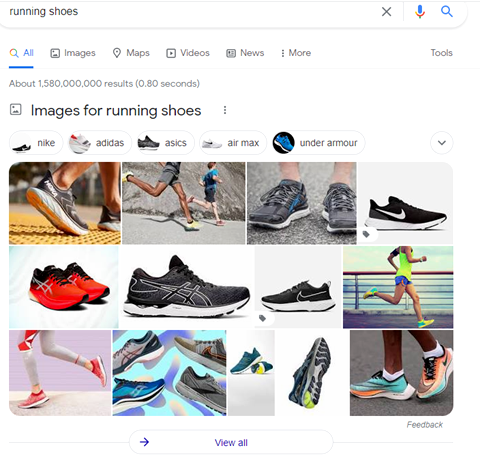
An image pack consists of a series of images displayed by Google in the search results for queries related to images. Google identifies search queries with visual intent and presents users with a carousel of images relevant to their search term. When Google’s algorithm determines that visual information is relevant to a search, the SERP will include a row of images. Clicking on any of the images directs you to the images tab of Google. Google introduced Image Packs directly on the SERP in the early 2010s, and it has since become a significant component of search results.
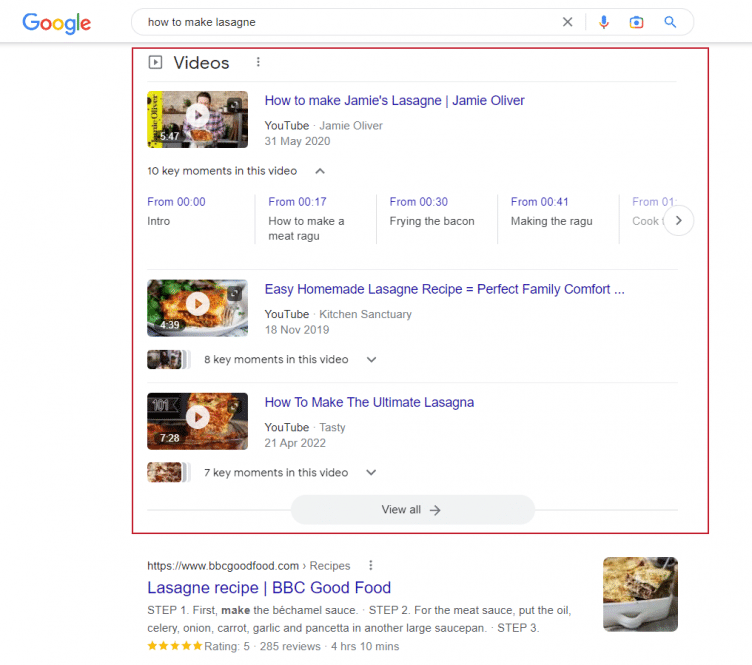
Google began displaying Video Carousels directly in the SERP in the mid-2010s, and it has since become an increasingly important part of the search results. Video carousels are a set of video results or video snippets that appear in the organic search results enhanced with a video thumbnail. They have a title and a description and most often they link back to YouTube. This organic SERP feature is Google’s response to a query that identifies as having visual/informational intent. Google video results only appear if a site has embedded video content that’s relevant to the search.
SEO Inc. reported that 62% of all Google searches include video carousels, and those videos are 50 times more likely to rank organically than plain text results. Video carousels are significant as they take a lot of SERP real estate. They often appear at or near the top of the page which makes it highly likely to get clicked. It is better to upload your videos through YouTube as YouTube is a product of Google.
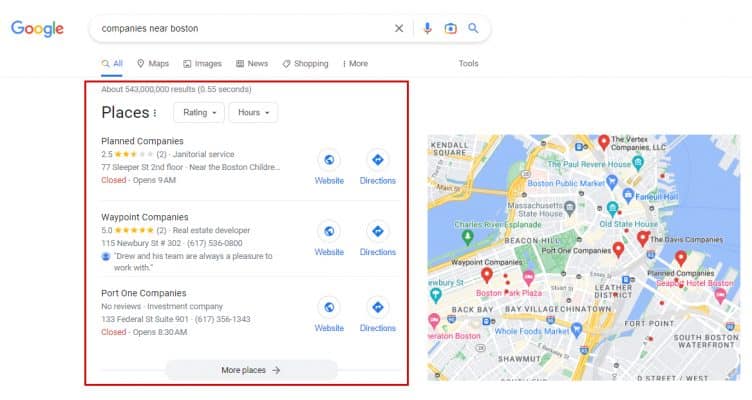
Google displays a local map pack to users when it detects that a search query has local intent. They have been displaying Local Map Packs directly in their SERP since the early 2000s. A local pack appears when someone enters a query with a location name or when Google’s algorithm finds that a searched item is available nearby.
The local pack appears as a map with pins indicating businesses that are relevant to the search term. A local map pack includes the top three physical locations that Google considers relevant, along with reviews, hours, contact information, a link to the website, and directions via Google Maps.
Learn more about it in our blog post “How to optimize for Local SEO”
Benefits of ranking on Local Map Pack Snippets
- It helps improve your visibility as it is almost always shown at the top of the SERP.
- The chance of getting clicks as the top 3 Google Search results is 75%.
- The pack shows your reviews which can greatly influence searchers.
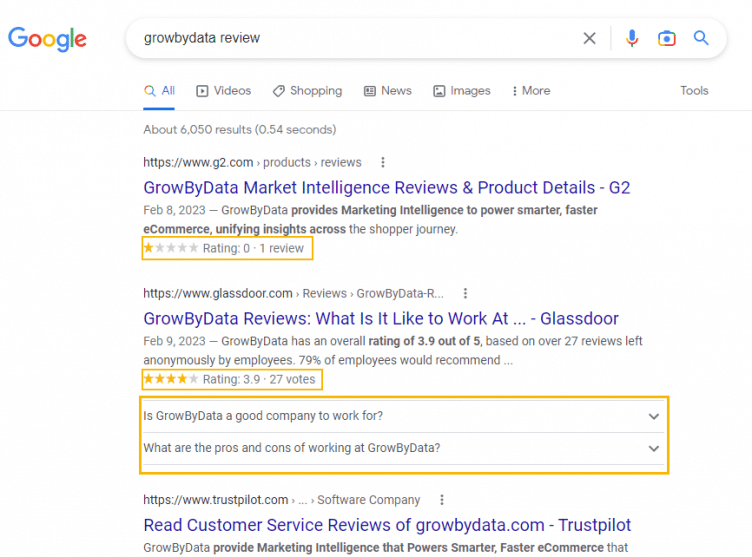
Rich snippets are organic SERP features for a specific result in the SERP that add extra visuals to a result, like stars in product reviews or photos in news results. It gives additional information other than a title tag, a description, and a URL which helps users decide in their clicking process. Google began displaying Rich Snippets directly in its SERP in the mid-to-late 2000s. FAQ snippets are a common form of rich snippets. With the extra information added to your listing, the chances of your listing getting clicked increase.
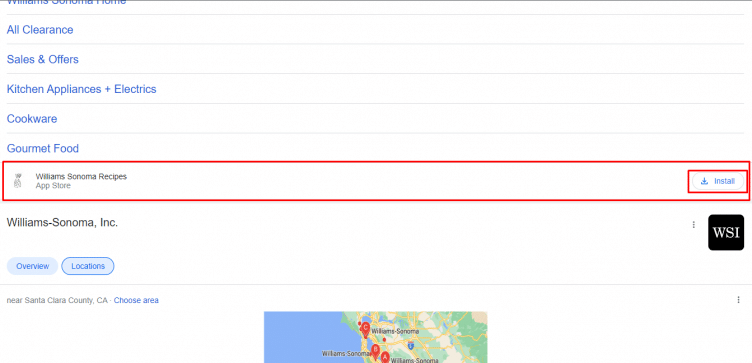
An “App Install” organic results is a feature that allows users to find and install new mobile apps directly from the SERP that are relevant to their search queries. These types of results are typically displayed in the SERP when a user’s search is related to a specific app or a type of app.
Google began displaying “App Installs” results directly in its SERP in 2013 with the aim of providing a more seamless and efficient user experience for those searching for apps. They often include a description of the app, it’s rating, reviews, and other relevant information to help users make an informed decision about whether or not to install it.
Benefits of Showing the App Install Snippet
- It provides mobile app developers with increased visibility for their apps in SERP.
- By prominently featuring app installs in SERP, users are more likely to install the app, leading to increased downloads for app developers.
- App Install as a feature in SERP provides a more convenient and seamless way for users to access the app, improving the overall user experience.
- It provides valuable data on users’ behavior and preferences to help make informed decisions.
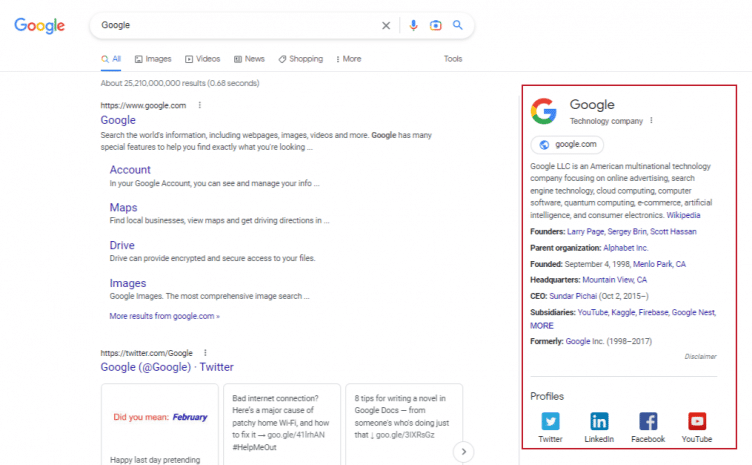
A knowledge panel often includes images, facts, social media links, and other relevant information to the search query. Knowledge panels show up on the right side of the organic results with informational intent about businesses, brands, or organizations.
This feature normally appears when the search is tailored for specific places, organizations, people, events, etc. Usually, Google pulls information for the Knowledge Panel from Wikipedia or other specific entity’s website. Google began displaying Knowledge Panels directly in its SERP in the early 2010s.The benefit of having your businesses show up on the Knowledge Panel can boost both authority and credibility for your brand.
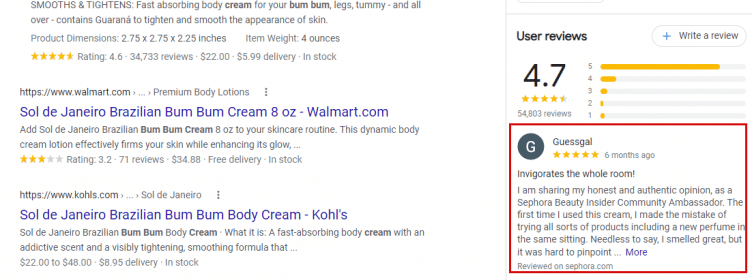
The Knowledge Panel Review feature in SERP allows users to see customer reviews and ratings for a product or service in the search results. It involves the process of reviewing and providing feedback on the information displayed in a Knowledge Panel. This feature provides valuable information to users, helping them make informed purchasing decisions based on the experiences of other customers.
The appearance of Knowledge Panel Review in organic results can have a significant impact on user behavior, as users are more likely to click on results with positive reviews and ratings. Overall, Knowledge Panel Review as an organic result in SERP will be a valuable tool for organizations looking to improve their online presence, build credibility, and drive traffic and customer engagement.
Benefits of Knowledge Panel Review
- It provides users with an overall positive experience as it enables them to have access to customer reviews and ratings on particular products or services.
- Improves businesses’ online reputation by displaying positive customer feedback in the search results.
- Provides organizations with an increased visibility in the SERP, which helps drive traffic to their website.
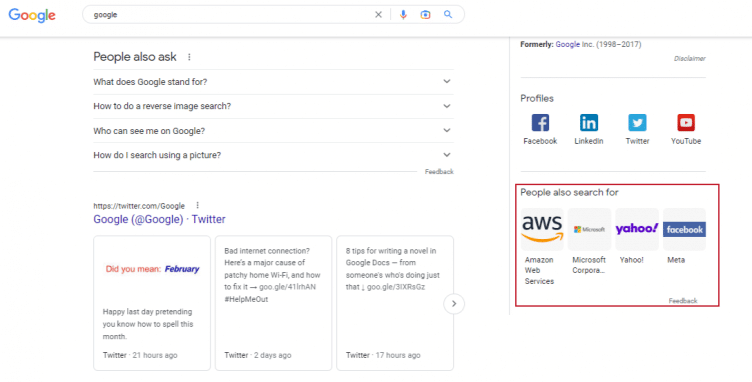
On February 13, 2018, Google introduced the “People Also Search For” query refinement box. This organic SERP feature, located at the bottom of a Google search result page, presents a list of related search queries for a specific search query. This SERP feature provides users with additional information and options to explore related topics and queries making a seamless search process The purpose of this feature is to provide users with quick access to explore related topics and queries, facilitating a seamless search experience. The queries in the “People Also Search For” list are determined by Google’s algorithm, based on factors such as the user’s search history, the content of the web pages that are being searched, and the overall popularity of the related queries.
Benefits of showing on People Also Search For
- Helps users understand the context of their original search query.
- Provides quick access to related topics and information.
- Provides website owners with an opportunity to target new keywords and topics.
- Increases the visibility of the website & drives additional traffic to the site from related queries.
- Enhances the user experience and improves the discoverability of relevant information on the web
Get the Complete Guide on People Also Search For.
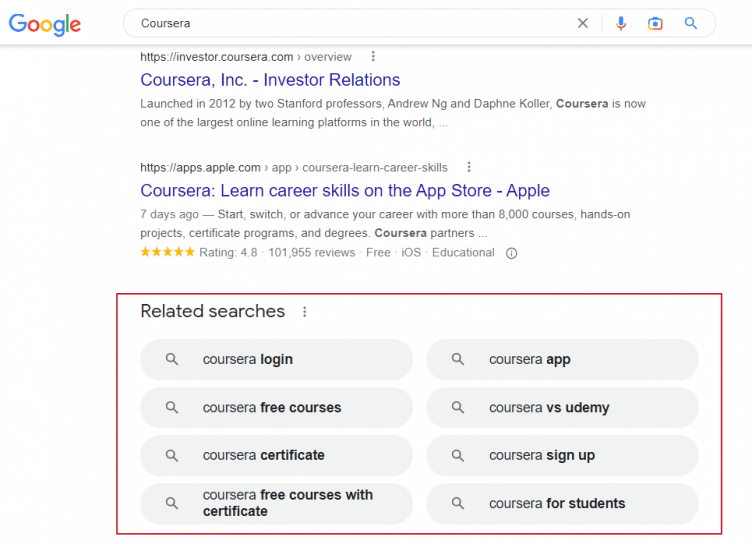
The “Related Searches” is also a list of related search queries that appear at the bottom of the SERP. This organic SERP feature aims to provide users with additional information on a related topic, making it easier for them to find the desired information. The related searches are determined by the search engine’s algorithm, which considers factors such as the user’s search history, the popularity of related queries, and the content of the web pages being searched.
Benefits of the Related Searches snippet
- It helps users better understand the context of their original search.
- Helps users discover new topics of interest & broaden their understanding of a particular subject.
- Improves the user experience and helps users find the information relevant to their needs.
- Increases the visibility of a website by appearing on related search results.
- Helps drive additional traffic to a website from related queries.
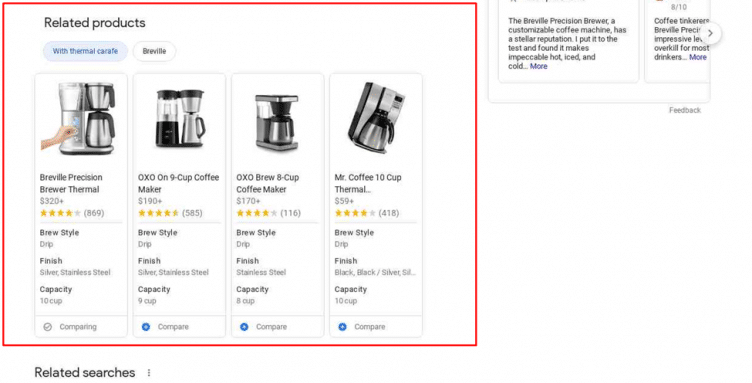
The “Related Products” feature in a SERP is a list of similar or complementary products that appear on searches related to shopping or product-related queries. With quick and easy access, users are able to easily get additional information on related products using this feature. The related products are determined by the search engine’s algorithm based on factors such as the user’s search history, the popularity of related products, and the content of the product pages being searched.
Benefits of ranking on on Related Products
- Users are able to find products per their needs & have the option to compare before purchasing.
- This feature provides e-commerce sites with increased visibility & exposure for their products.
- Users are provided with the most up-to-date and relevant information as it is updated in real-time.
- Improves user experience and makes it easier for them to discover new products per their need.
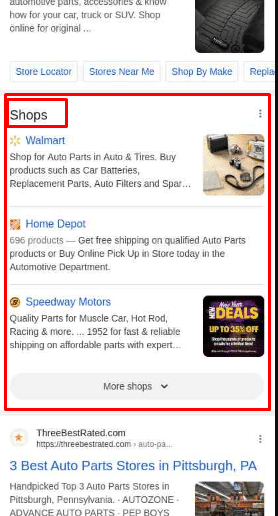
Google’s “Shops” feature began displaying in the SERP in 2020. The goal is to provide users with a visual and interactive shopping experience and help them discover new products while making informed buying decisions. If a product is displayed in the shop’s organic results, it is indicative that the product is in high demand and offers value to customers.
When you search for any product or category, the shop’s feature will appear at the top of the SERP with product images, prices, and the logos of participating retailers. This makes it easier for users to find and compare prices, while retailers, on the other hand, can get more viewership on their products.
Benefits of Shops
- Users are able to discover new products, compare prices & features, and find the right products.
- For retailers, appearing in Shops organic results can be a great way to get more visibility and drive more traffic to their websites.
- It also attracts high-intent customers as the Shops feature is only displayed for certain types of product-related searches.
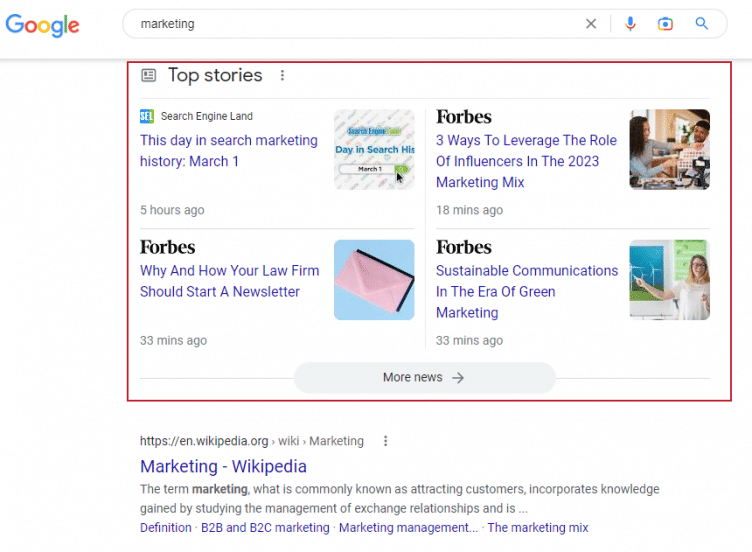
Top Stories is a feature in Google’s SERP that showcases a curated selection of news articles related to the user’s search query. The top Stories feature is designed to provide users with quick access to the latest news and information on a variety of topics, including current events, politics, sports, entertainment, and more.
When you search for a topic or keyword, the Top Stories feature will appear at the top of the SERP with a carousel of headlines, images, and brief descriptions of the articles. The articles are selected based on their relevance to the user’s search query and their timeliness, ensuring that users have access to the most relevant and latest information on the topics they’re interested in.
Benefits of ranking on Top Stories
- It provides users with a quick and convenient way to stay up to date on the latest news.
- Appearing in the Top Stories feature increases a publisher’s visibility and readership, helping them reach a wider audience and attract more traffic to their website.
- Getting featured in the Top Stories feature helps establish the publisher’s credibility and authority.
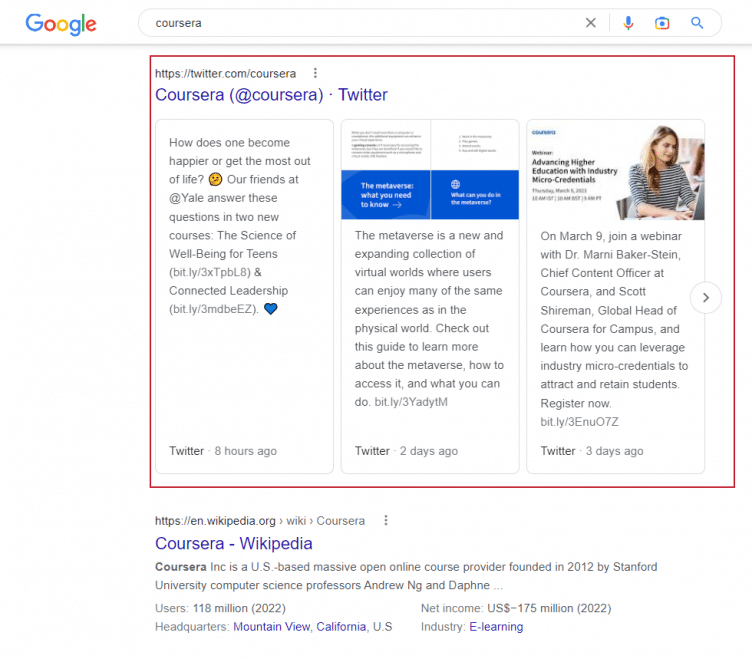
The “Tweet” feature in Google’s SERP allows users to view and interact with tweets directly from the search results. This feature allows users to see tweets related to their search query without having to leave the SERP and navigate to the Twitter website. When a user searches for a topic or keyword that is related to a popular Twitter conversation, the Tweet will appear in the search results, showcasing a selection of relevant tweets. The tweets are displayed with the username, profile picture, and a brief excerpt of the tweet. Users are able to expand the tweet to see the full text and any media attachments.
Google has been displaying tweets directly in its SERP since 2015. The integration of tweets into Google’s search results was part of a partnership between Google and Twitter, which aimed to provide users with quick access to real-time, relevant information and insights on their search queries.
Benefits of Tweet
- Provides a convenient and immersive way to see and engage with all the tweets directly from the SERP.
- Tweet helps increase the visibility and Twitter users’ reach and also provides a new channel for engagement with their followers.
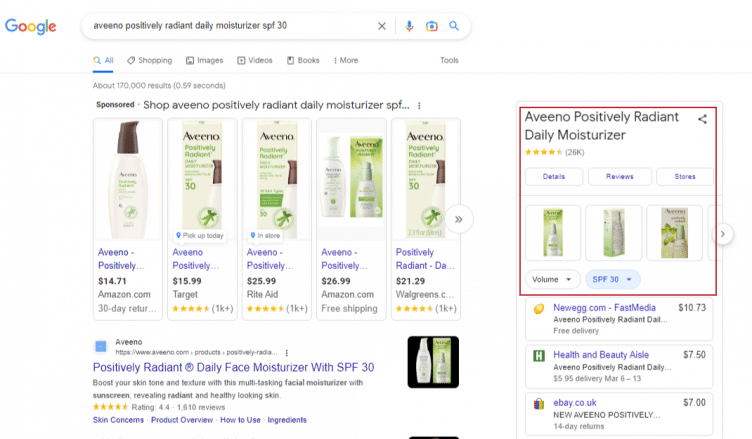
Multistore are SERP results that refer to sponsored listings from multiple online stores. They appear at the top or bottom of a SERP depending on the user’s search query. These listings are marked as “sponsored” or “ad” and allow users to compare products, prices, and availability from different online retailers for a specific product or category of products.
A store’s appearance in the multistore SERP feature is determined by several factors like search engine algorithms, bid amount, relevancy & quality of the store’s website, and product offerings.
Benefits of Shopping-Multistore
- This feature provides online retailers with increased visibility & the ability to reach a wider audience.
- Users can compare products, prices, and availability from multiple retailers all in one place; saving time and effort.
- The multistore SERP feature can increase competition amongst online retailers, which can result in a lower price and improve product offerings for users.
Paid SERP Features are the elements or listings that appear on a SERP as a result of Search engine Paid Campaigns. Paid results cost a charge for advertisers to appear on the SERP as opposed to organic results.
The paid SERPs include a label at the top indicating the result is an ad. Paid results have a wide range of forms and formats that serve advertisers’ needs. The two types of Paid SERP features are i) Google Text Ads and ii) Google Shopping Ads. Paid ad spots are won by bidding on keywords.
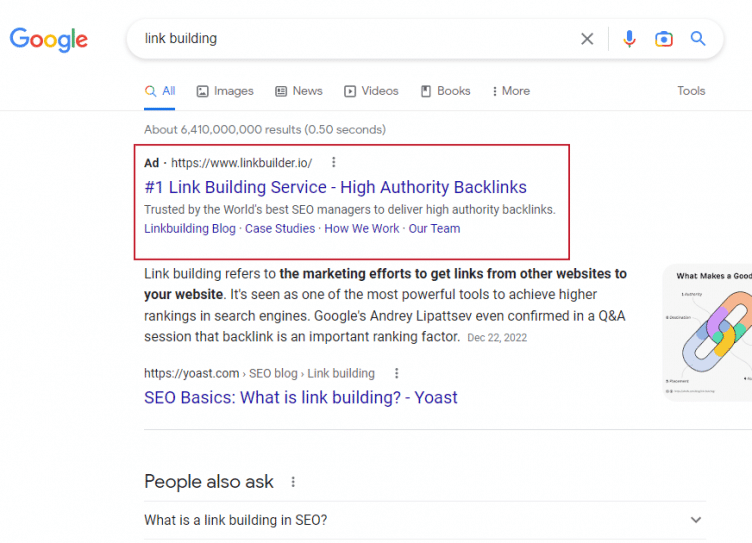
Google Text Ads are paid advertisements created by advertisers aiming to have their links displayed in Google’s search results for a keyword. Google initially introduced text ads directly on its SERP in 2000, coinciding with the launch of its AdWords advertising platform. These ads typically include headlines, the display URL, descriptions, and a call-to-action. Additionally, they may occasionally include site links, phone numbers, reviews, and other search features.
Google SERP has two main advertising positions for Google Ads:
- At the very top of the SERP page above the organic search results and
- At the bottom of the SERP page
The placement of the ad depends on the advertiser’s bidding strategy. Ads listed on the top are more effective and have higher clickability and visibility. Reaching the top of the SERP requires a high-quality site and a high pay-per-click bid depending on the competitiveness of the keyword.
Benefits of Google Text Ads:
- It shows up above the organic results increasing your visibility.
- Allows you to show up on specific keywords of your choice.
- Ads are shown to those people who have an interest in the product or service you are offering.
- It is a cost-effective option for businesses as advertisers only have to pay once someone clicks on their ad.
- Text Ads provide immediate results generating quick visibility and clicks.
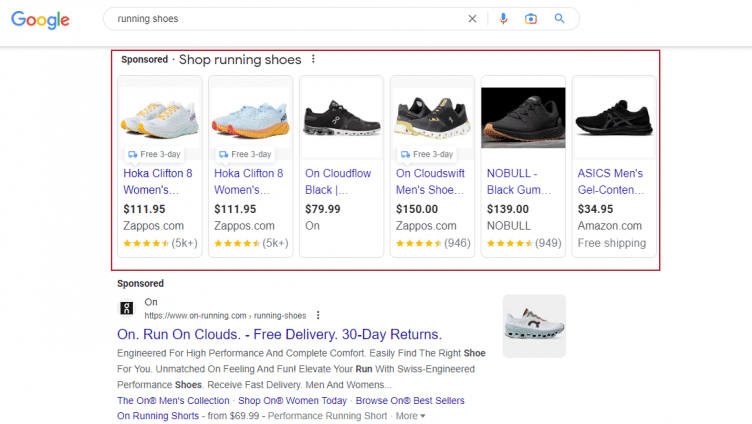
Google Shopping Ads, also known as Product Listing Ads (PLAs), was first introduced by Google in the early 2010s. Shopping ads are paid SERP features with paid ad placement on Google. Google Shopping Ads displays a carousel of products relevant to a user’s keyword that are available for purchase from paid advertisers. It allows people to quickly browse products across multiple e-commerce websites on the SERP. Shopping ads display the product name, image, retailer, brand, and price, along with special offers, product ratings, number of reviews, and links to the website.
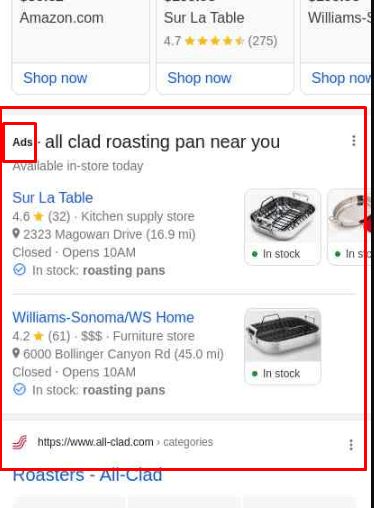
Map-Local search ads are also paid ad results in SERP that businesses pay to have it appear in the Map-Local feature. When a user conducts a search for a local business or service, these paid results will appear alongside any organic (non-paid) results in the Map-Local feature. This feature shows a map with markers for different businesses that match the search query, along with a list of those businesses and their contact information. Users can access relevant information about the business, such as its address, phone number, business hours, customer reviews, and website by clicking on a marker. The businesses listed in these paid results have created a Google My Business profile and are using Google Ads to promote their business.
Benefits of Map-Local Search Ads
- Helps users find local businesses matching their search query quickly and provides users with a visual representation of local businesses and services.
- Improves the overall search experience by providing more comprehensive and relevant results.
- Provides an opportunity to boost visibility to potential shoppers who are searching for local products & services.
- Businesses can improve their advertising return on investment (ROI) by directly reaching their targeted audience.
With the vast knowledge you have acquired on SERP features, you can better strategize your content and optimize your site to appear on more SERP features. However, it is also important to keep in mind that the effect of each SERP feature varies depending on your particular niche.
To understand your industry, category and keyword level SERP by location, Search Intelligence Solutions comes into play. The tool tracks search rankings and SERP features for your important queries . If you are planning to rank on certain SERP features, you can see what keywords the SERP appear in and in what position on the page. You can use this to optimize SERP features and gain visibility in new SERP and boost traffic and click-through rates (CTR) on your existing SERP listings. To show up on those features, your focus should be on understanding the SERP and optimizing your content accordingly.
Get started with Search Intelligence Solutions today and unlock the full potential of your SEO efforts! Please contact us @info@growbydata.com to learn more.
